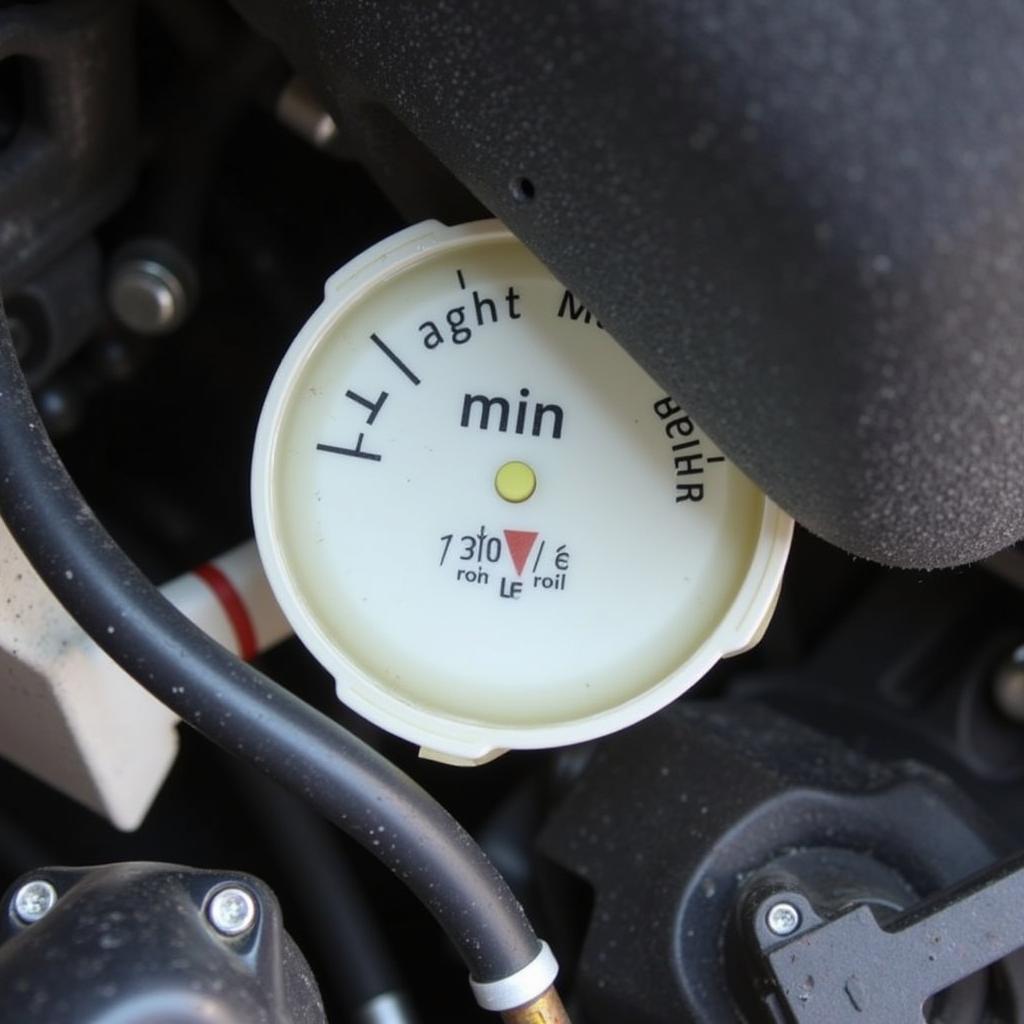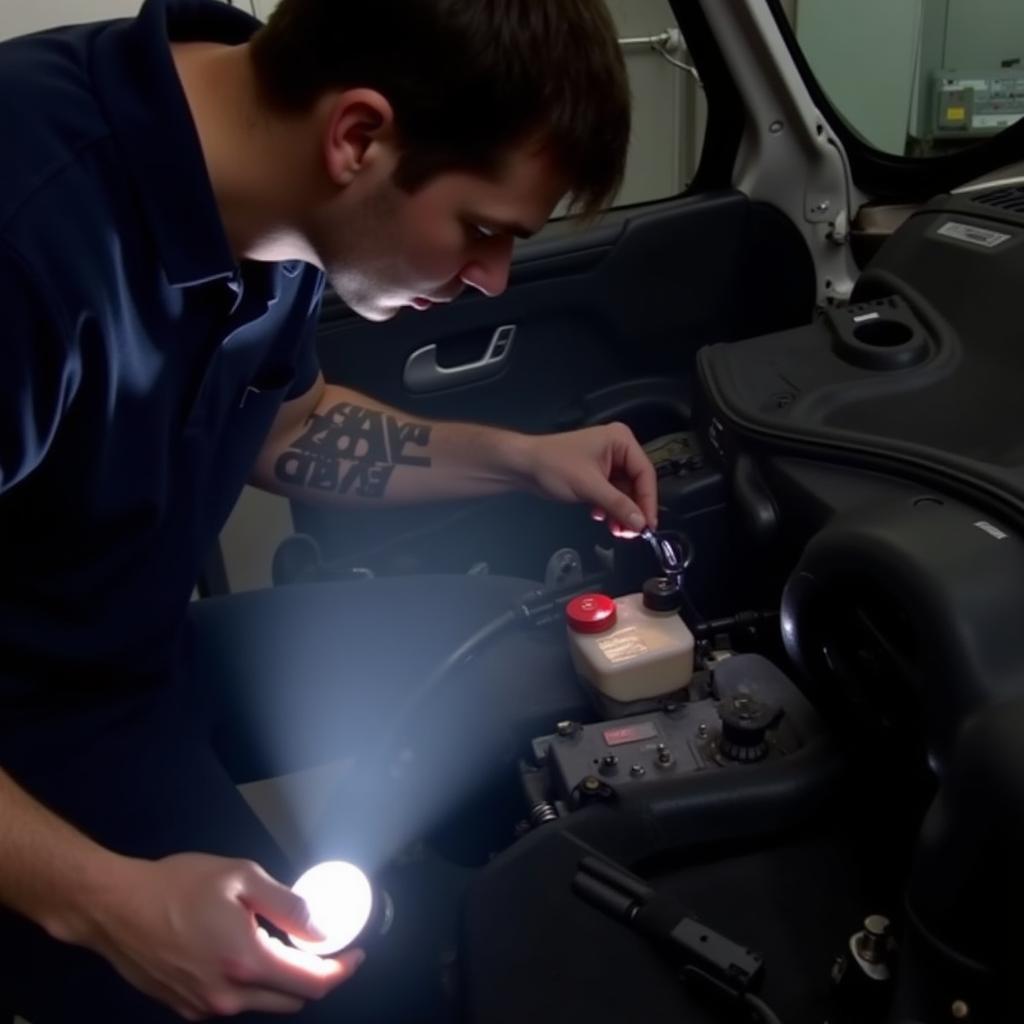The brake system warning light is one of the most important warning lights on your dashboard. It can illuminate for a variety of reasons, ranging from a simple reminder to engage the parking brake to a serious issue with your braking system. Understanding what the brake system warning light means can help you address the problem promptly and safely.
Common Reasons Why Your Brake System Warning Light is On
There are several reasons why your brake system warning light might be on. Some of the most common causes include:
- Parking brake is engaged: This is the most common reason for the brake system warning light to come on. Always double-check your parking brake before driving.
- Low brake fluid level: Brake fluid is essential for your brakes to function properly. A leak in the brake lines or worn brake pads can cause the fluid level to drop, triggering the warning light.
- Worn brake pads: Your brake pads have wear indicators that make a noise when they are getting thin. If you ignore this noise, the brake system warning light may illuminate.
- ABS issue: If there’s a problem with your Anti-lock Braking System (ABS), the warning light dedicated to ABS might turn on, often accompanied by the general brake system warning light.
- Brake system malfunction: A faulty brake caliper, brake hose, or master cylinder can also trigger the warning light.
 Brake fluid reservoir with low fluid level
Brake fluid reservoir with low fluid level
What to Do When Your Brake System Warning Light Comes On
If your brake system warning light comes on, it’s crucial to take immediate action. Here’s a step-by-step guide:
-
Safely pull over: Find a safe place to pull over as soon as possible.
-
Check your parking brake: Ensure that your parking brake is fully released.
-
Check your brake fluid: If you feel comfortable doing so, carefully check your brake fluid level. If it’s low, you may need to add more. However, a sudden drop in brake fluid often points to a leak, which requires immediate professional attention.
-
Do not continue driving if:
- You notice a leak in your brake system
- Your brake pedal feels spongy or goes all the way to the floor
- Your car pulls to one side when braking
- You hear unusual grinding or screeching noises when braking
-
Call a mechanic: If you notice any of the above symptoms or if you are unsure about the cause of the problem, call a qualified mechanic immediately to diagnose and repair the issue.
Remote Diagnostics and Software Solutions for Brake System Issues
In today’s technologically advanced world, remote diagnostics and software solutions play a significant role in identifying and resolving car problems, including those related to the brake system. Here’s how remote services can help:
-
Remote diagnostics: By connecting your car to a diagnostic tool remotely, skilled technicians can access your vehicle’s computer system to read fault codes, analyze data related to the brake system’s performance, and identify the root cause of the issue.
-
Software updates and reprogramming: In some cases, brake system problems might stem from software glitches. Remote programming allows manufacturers to update your vehicle’s software, addressing known issues and potentially resolving brake system malfunctions without the need for a physical visit to a service center.
ford check brake system warning light
The Importance of Timely Brake System Maintenance
Regular maintenance is crucial for keeping your brake system in optimal condition and preventing potentially dangerous situations. Here are some maintenance tips:
- Regular brake inspections: Have your brakes inspected by a qualified mechanic at least once a year or as recommended in your vehicle’s owner’s manual.
- Brake fluid flush: Brake fluid should be flushed and replaced every 2-3 years or as recommended by your mechanic.
- Timely brake pad replacement: Don’t ignore the squealing sound of worn brake pads. Replace them promptly to avoid damaging your rotors and compromising braking performance.
“Ignoring your brake system warning light can lead to serious consequences,” says Jake Miller, a seasoned automotive engineer specializing in brake systems. “Timely attention and proper maintenance are essential for ensuring your safety and the optimal performance of your vehicle.”
toyota camry brake system warning light
FAQs about Brake System Warning Lights
What does a yellow brake system warning light mean?
A yellow brake system warning light usually indicates a less severe issue, such as worn brake pads. However, it’s still crucial to get it checked out by a mechanic promptly.
yellow brake system warning light
What does a red brake system warning light mean?
A red brake system warning light signifies a more serious problem that requires immediate attention. It could indicate low brake fluid or a complete brake system failure.
Can I drive with the brake system warning light on?
It’s strongly advised not to drive with the brake system warning light on. Doing so could be dangerous.
anti-lock brake system warning light nissan
How much does it cost to fix a brake system warning light?
The cost of fixing a brake system warning light can vary widely depending on the underlying cause. It could range from a simple brake fluid top-up to a more complex repair involving brake calipers or the master cylinder.
How do I reset my brake system warning light?
The brake system warning light will typically reset itself once the underlying issue has been addressed. If the light remains on after the repair, there might be a lingering problem or a need for a system reset using a diagnostic tool.
brake hydraulic system warning light
Conclusion
The brake system warning light is a crucial safety feature in your vehicle. Understanding what it means and taking prompt action can prevent accidents and ensure your safety on the road. If your brake system warning light comes on, don’t hesitate to pull over and seek professional assistance from a qualified mechanic. Regular maintenance, including brake inspections and timely repairs, can go a long way in preventing brake system problems and ensuring the optimal performance of your vehicle.

